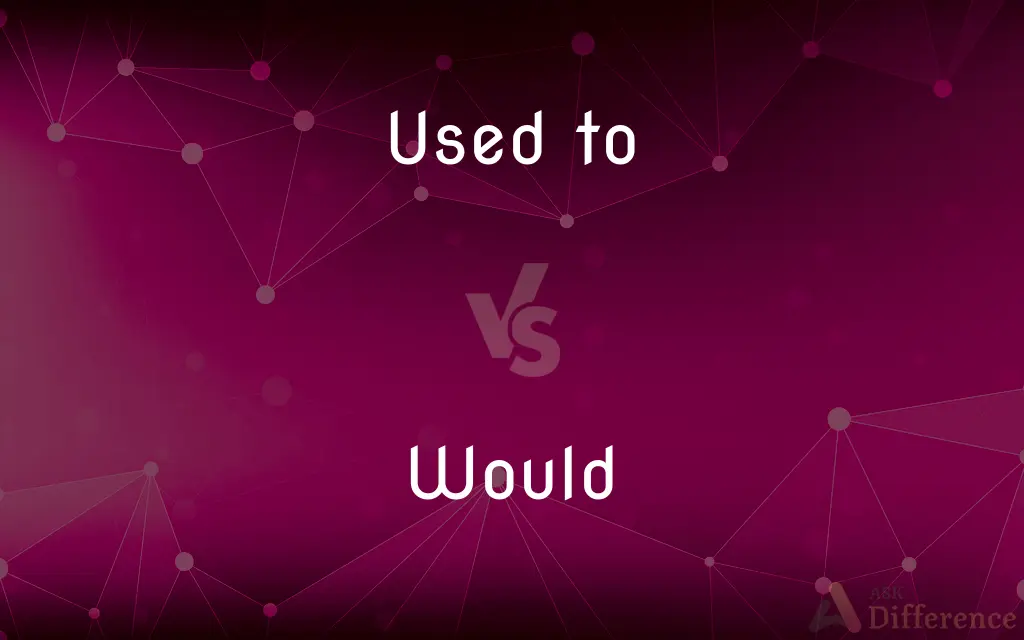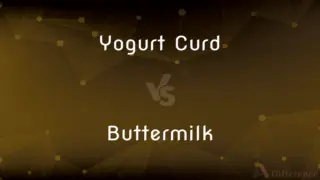Used to vs. Would — What's the Difference?
Edited by Tayyaba Rehman — By Fiza Rafique — Published on December 7, 2023
Used to refers to past habits or states, while Would denotes past repeated actions or future conditionals.

Difference Between Used to and Would
Table of Contents
ADVERTISEMENT
Key Differences
Used to and Would are both employed to discuss past habits, but they have nuanced applications. While "Used to" is used specifically to talk about past habits or states that no longer exist, "Would" can be employed to speak about past repeated actions.
In sentences, Used to invariably indicates something was a routine in the past but isn't anymore. For instance, "I used to jog every morning." On the other hand, Would can describe something done repeatedly in the past, like, "When I was a child, I would jog with my dad every Sunday."
A key differentiation between Used to and Would lies in the context. "Used to" can describe past states, not just actions. For instance, "I used to be shy." In contrast, "Would" doesn't fit this function. Saying "I would be shy" doesn't mean the same thing.
Another distinction emerges when considering future conditionals. Would is employed in hypothetical or uncertain situations about the future: "I would go if I had the time." Used to, on the other hand, does not play a role in future conditionals.
Finally, while Used to is solely past-focused in its common usage, Would has a broader application. Besides denoting past repeated actions, it can also express polite requests, offers, or invitations in the present, like "Would you like some coffee?"
ADVERTISEMENT
Comparison Chart
Purpose
Indicates past habits or states.
Indicates past repeated actions or future conditionals.
Application
Specific to actions/states that no longer exist.
Can describe repeated past actions or hypothetical futures.
States vs. Actions
Can describe past states.
Primarily describes actions.
Time
Solely past-focused.
Past and potential future.
Other Usages
Limited to past contexts.
Can express polite requests, offers, or invitations.
Compare with Definitions
Used to
Refers to past habits.
I used to play basketball.
Would
Expresses polite requests.
Would you please close the door?
Used to
Reflects past regularities.
They used to meet every week.
Would
Past tense of will; usually followed by a bare infinitive.
Used to
Indicates actions/states that no longer occur.
She used to live in New York.
Would
Used to form the "anterior future", or "future in the past", indicating a futurity relative to a past time.
On my first day at University, I met the woman who would become my wife.
Used to
Describes former conditions or situations.
This used to be a busy street.
Would
Used to; was or were habitually accustomed to; indicating an action in the past that happened repeatedly or commonly.
When we were younger, we would cycle out to the beach most summer Sundays.
Used to
Signifies previous familiarity or experience.
I used to know that song by heart.
Would
Was or were determined to; indicating someone's insistence upon doing something.
I asked her to stay in with me, but she would go out.
Would
Could naturally have been expected to (given the tendencies of someone's character etc.).
He denied it, but then he would, wouldn't he?
Would
(archaic) Wanted to.
Would
(archaic) Used with ellipsis of the infinitive verb, or postponement to a relative clause, in various senses.
Would
(obsolete) Wished, desired (something).
Would
A modal verb, the subjunctive of will; usually followed by a bare infinitive.
Would
Used as the auxiliary of the simple conditional modality, indicating a state or action that is conditional on another.
If I won the lottery, I would give half the money to charity.
Would
Without explicit condition, or with loose or vague implied condition, indicating a hypothetical or imagined state or action.
I would love to come and visit.
Look at that yummy cake! I would eat that all up!
Would
Suggesting conditionality or potentiality in order to express a sense of politeness, tentativeness, indirectness, hesitancy, uncertainty, etc.
I would ask you all to sit down.
I would imagine that they have already left.
Would
Used to express what the speaker would do in another person's situation, as a means of giving a suggestion or recommendation.
It's disgraceful the way that they've treated you. I would write and complain.
Would
Used to express the speaker's belief or assumption.
He's very security-conscious, so he would have remembered to lock the door.
They would be arriving in London round about now.
Would
Used interrogatively to express a polite request; are (you) willing to …?
Would you pass the salt, please?
Would
Might wish (+ verb in past subjunctive); often used in the first person (with or without that) in the sense of "if only".
Would
Might desire; wish (something).
Would
Something that would happen, or would be the case, under different circumstances; a potentiality.
Would
Commonly used as an auxiliary verb, either in the past tense or in the conditional or optative present. See 2d & 3d Will.
Right as our Lord hath would.
Would
See 2d Weld.
Would
Indicates past repeated actions.
Every summer, we would visit our grandparents.
Would
Denotes future actions in the past.
I knew she would become a great writer.
Would
Used in hypothetical situations.
I would travel more if I had the money.
Would
Reflects preference or desire.
I would rather stay home tonight.
Common Curiosities
Is "Would" limited only to past actions?
No, "Would" can also express future conditionals and polite requests.
Can "Used to" describe current habits?
No, "Used to" is specific to past habits or states that no longer exist.
Can "Would" describe past states like "Used to"?
No, "Would" primarily describes past repeated actions, not states.
Can "Would" express wishes?
Yes, "Would" can express wishes or desires, like "I would love to join."
Does "Used to" have a present form?
No, "Used to" doesn't have a present form. We can't say "I use to."
How do you form negative with "Used to"?
"Didn't used to" is the negative form, e.g., "I didn't used to like spinach."
How is "Would" used in reported speech?
"Would" is often used for reporting future intentions, e.g., "She said she would call."
Can "Used to" be used for future situations?
No, "Used to" is solely for past contexts.
Can I replace "Used to" with "Would" in all situations?
No, they have distinct applications and cannot always replace each other.
How is "Used to" pronounced?
It's pronounced as "yoost to," with the "s" sounding like the one in "use."
Can "Would" be used for unreal past situations?
Yes, "Would" can be used in the third conditional to talk about unreal past situations, e.g., "If I had known, I would have come."
Is "Used to" only about actions?
No, "Used to" can also describe past states or conditions.
Can "Would" be used for making offers?
Yes, "Would" can be used for offers, e.g., "Would you like some tea?"
Can I use "Would" for past habits without specifying a time period?
It's usually clearer with a time reference. Without it, "Would" can be ambiguous.
Are "Used to" and "Would" modal verbs?
"Would" is a modal verb, but "Used to" is considered a semi-modal or quasi-modal expression.
Share Your Discovery

Previous Comparison
Partnership vs. Limited Liability Partnership
Next Comparison
Yogurt Curd vs. ButtermilkAuthor Spotlight
Written by
Fiza RafiqueFiza Rafique is a skilled content writer at AskDifference.com, where she meticulously refines and enhances written pieces. Drawing from her vast editorial expertise, Fiza ensures clarity, accuracy, and precision in every article. Passionate about language, she continually seeks to elevate the quality of content for readers worldwide.
Edited by
Tayyaba RehmanTayyaba Rehman is a distinguished writer, currently serving as a primary contributor to askdifference.com. As a researcher in semantics and etymology, Tayyaba's passion for the complexity of languages and their distinctions has found a perfect home on the platform. Tayyaba delves into the intricacies of language, distinguishing between commonly confused words and phrases, thereby providing clarity for readers worldwide.
















































